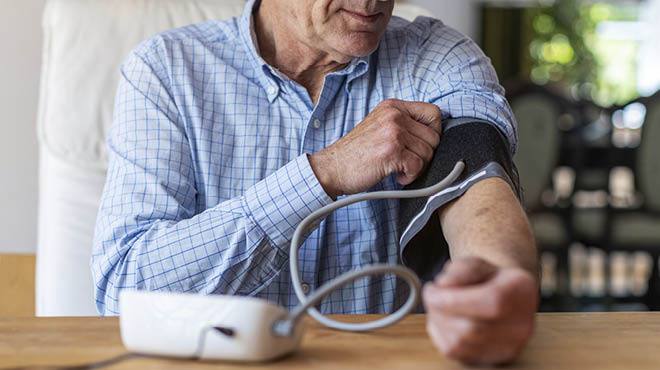-
Cardiovascular
Home blood pressure monitoring benefits Dan Knapp

At 77, Dan Knapp prioritizes his health. "For the past twelve years, I've scheduled annual visits to monitor my conditions," says Knapp, a longtime patient at Mayo Clinic Health System in Eau Claire, Wisconsin. "It gives me peace of mind, knowing I'm doing everything I can to stay ahead of any potential issues."
During these visits, Dan meets with his primary care team to discuss medication and lifestyle changes that may affect his well-being. The team also monitors his chronic conditions, which include diabetes and high blood pressure.
Why your blood pressure matters
Having high blood pressure increases the risk of heart disease and stroke, which are the leading causes of death in the U.S.
Blood pressure measures how hard blood pushes against arteries as it moves through the body. Over time, elevated or high blood pressure makes the heart work harder and less efficiently. It can also damage the eyes, kidneys and blood vessels.
Blood pressure readings fall into four categories: Normal, elevated, hypertension stage 1 and hypertension stage 2. Knowing your blood pressure numbers is critical for maintaining or improving your health.
Increasing convenience with at-home monitoring
Controlling high blood pressure requires consistent effort from both patients and healthcare teams. Historically, this has involved in-person visits for regular monitoring.
However, for many people, especially those in rural areas, the inconvenience of these visits can be a barrier to effective care.
A home blood pressure monitoring program offers people more control and convenience when tracking their readings.
Based on recommendations from the American Medical Association and American Heart Association, people are educated on proper techniques for using their own blood pressure monitors at home.
Monitors that allow upper arm blood pressure and ensure proper cuff size have the most accurate readings.
Readings can then be manually entered into the patient portal or through Bluetooth-enabled devices.
"Home blood pressure monitoring is a terrific option for our patients," says Christopher Roberts, M.D., a Primary Care physician in Eau Claire. "Mr. Knapp was motivated to get his blood pressure under control, which made him an excellent candidate for this program. It has saved him the cost and inconvenience of driving 80 miles to our clinic."
"The whole process is incredibly user-friendly — even for a non-tech savvy guy like me," Dan says. "Not all my readings are perfect, but when they're not, I know my care team will be on top of it."
If the blood pressure readings show concerning trends over time, your healthcare team can recommend lifestyle or dietary changes and make medication adjustments.
For Dan, this enhanced access has paid off. His most recent blood pressure was 125/69, a dramatic improvement from his starting point.
"Overall, I’m a healthier person because of this process," says Dan. "As I've gotten older, my health has become more important — you can't wait until things go wrong to fix them. I want to live a long time, and this is a way I can do that."
This article first published on the Mayo Clinic Health System blog.







